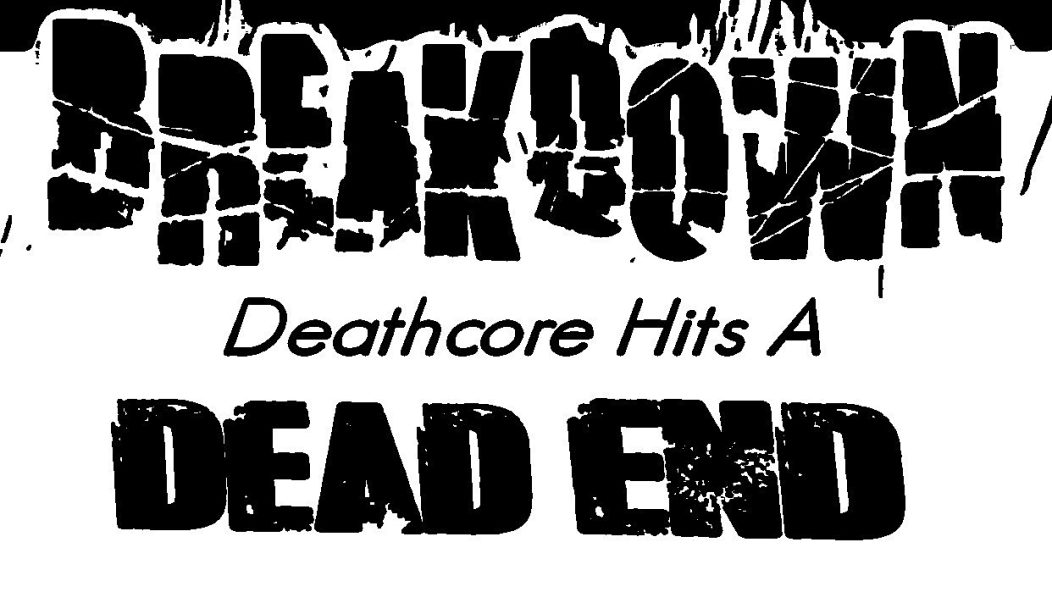
Breakdown: Deathcore Hits A Dead End
…
Perhaps the most shat-upon metal subgenre of them all: deathcore. Formerly a home to a distinct brand of heaviness and technical innovation, deathcore hit the mainstream and got plainstream. Live, deathcore makes a ton of sense, as breakdowns have a clean impact and obvious appeal. On record, things get tougher: listeners pay closer attention to detail, and the likelihood of boredom increases when there simply isn’t any. Recognizing this, deathcore has been reduced to mere performance, “live only” music, no longer championing the music itself but rather its ability to stir up tornadic, throwdown crowds. Slam, slam, slam until you can’t slam anymore.
Most deathcore bands with promising early releases either stuck around and got worse, e.g. Born Of Osiris (whose 2007 debut The New Reign is a masterpiece) and The Acacia Strain, or perished early-on. Some big-hitters came to power, bands like Job For A Cowboy, Through The Eyes Of The Dead, and All Shall Perish. There was promising material there, but evolution took a sour turn and the magic died. What’s left lays dead at the feet of a bulging poser scene with an affinity for uninspired breakdowns and esoteric fashion accessories.
Eventually, 2017 rolls around, and here we are: the two main deathcore bands of today have recently released albums, Look At Yourself by Emmure, and Suicide Silence by Suicide Silence. Simply put, they are godawful, and their failure clearly indicates the failure of this subgenre. Specifically, the failure to hoist the best on high, to give primacy to bands who write interesting (versus cheap) content, and to reject copycats and failed experiments. The scene has also failed to accept the death metal influences which were its wellspring in the first place.
Emmure have written a copycat album. Suicide Silence have experimented and failed. Plain and simple, no surprises.
…
…
In a rare and promising display, though, the scene seems to be swimming toward the edges of a pool that now contains two humongous turds. Reception and sales have been poor, and hilarious, especially for Suicide Silence. Some fans even wanted to block its release. The band’s last album, 2014’s You Can’t Stop Me, peaked at #5 on the Billboard Top 200 and stayed there for five weeks. The self titled peaked at #163 and stayed there for one week. Emmure’s preceding album Eternal Enemies managed to hit #57 back in 2014, but they missed that mark at #73 with their latest. No substantial change there, probably because nothing about the new album is actually new.
While it’s sad that not trying at all (Emmure) is more acceptable to music fans than trying and failing (Suicide Silence), the point is to try and win. Yes, tougher than it sounds, but these are not amateur or unseasoned bands. Neither album showcases any honesty: they feel lazy and flaccid, released with the knowledge that the best work had not been done. Confidence is absent, and when success rides so heavily on the drama of performance, surefootedness makes all the difference.
Suicide Silence could be given credit for trying, but the effort is half-assed. There are out-of-tune vocals, messy guitar parts and a completely lackluster productions. Above all, the radical decision to almost completely exclude breakdowns seems like a put-on, as if in hopes that praise (or sales) would follow just doing something different. Deathcore does not suck because the breakdown is inherently stupid, which means that removing the breakdown will not cure deathcore. Deathcore sucks because bands have forgotten how to write breakdowns, yes, but also because they’ve forgotten that there needs to be quality music in between breakdowns to make them work.
…
…
To that end, Emmure royally fucks up. Look At Yourself slams away all day, but contains no real content. Live, tracks from this album will still produce the intended effect. But there’s no nuance, however slight it could be, to retain any deeper interest. Doing breakdowns all the time defeats the very purpose of the breakdown. Putting the “core” in deathcore must go beyond reimagining death metal through a singular lens, otherwise you’re writing incomplete music. Deathcore’s saturation with one-footed bands like Emmure illustrates an unhealthy obsession with just one particular musical component, shunning artists who are trying to do more. No wonder bands like Echoes Of Misanthropy and NovaThrone remain in the shadows.
While Suicide Silence and Emmure’s recent failures stick out from the pack, a little digging shows that the genre as a whole is losing economic steam. Nobody’s experienced a precipitous loss of goodwill the way Suicide Silence has, but Carnifex, Chelsea Grin, and Job for a Cowboy have all lost their charting ability over time. The industry as a whole is winding down, but older bands like Mastodon are charting better than ever while embracing radio rock and verse-chorus-verse song structures in the same general way that Suicide Silence is.
The only path to deathcore success is experimental success. This proves difficult in a subgenre characterized by short attentions spans and a highly physical live experience. The centrality of “the drop” is both the foundation and curse of deathcore. Technicality is perhaps the only solution, as early Beneath The Massacre illustrates, or Rings Of Saturn now. Or smaller details, like dual vocalists, e.g. Despised Icon. Things which can’t spoil deathcore’s live appeal but also benefit the music itself and the in-home listening experience. Also, there’s a balance to strike between death metal and deathcore while still remaining decisively deathcore, like The Red Chord demonstrated with their early work.
…
…
Deathcore is a great example of a subgenre whose scene has eaten itself. But something must come out of the other end, and we’re still waiting patiently for it. Quality future deathcore will be a revamped celebration of the breakdown, but with exercised respect. It’s undeniably easy to drop-z blast a crowd into a frenzy, but to keep them substantively listening over and over for texture is not. Turning to the tenants of death metal will yield solutions, but only if the populace embraces it. The right idea is to attract listeners from outside deathcore’s established circle, to broaden the appeal of the breakdown by situating it appropriately within a solid metal framework, and then innovating from there.
Suicide Silence must’ve known they were running the risk of alienating some fans, especially with those monumentally abysmal clean vocals, but they didn’t consider the risk of not attracting any new ones. Emmure just trusted that fans would buy a repackaged but identical product. These two positions are doomed from the start: they abandon the notion that bands not only give us what we want but can also determine what we want. Setting new expectations is the true power, not just delivering on existing ones.
…











